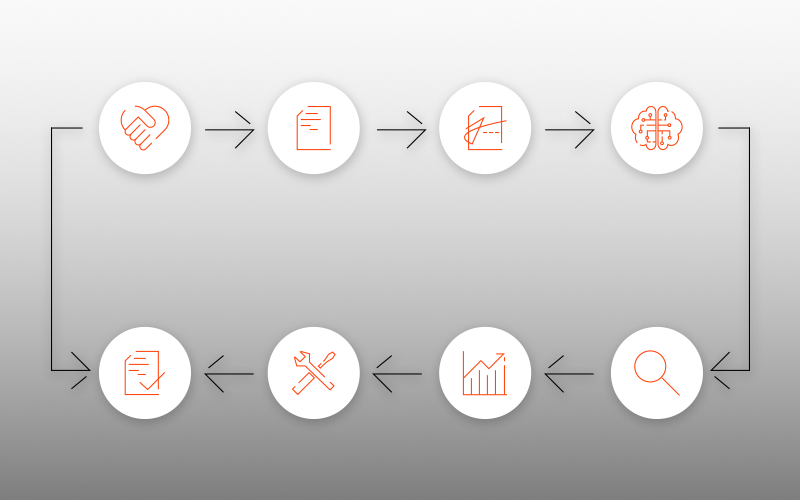How can an organization effectively manage routine contracts so crucial personnel can spend time on higher-value work? In The Future of Contracts: Keys to Managing Your Most Critical Contracts at Scale webinar, Ontra’s VP of Sales Brian Korchin and Managing Director, Account Management Nikhita Godiwala, along with Verana Health’s General Counsel Michelle McGovern, tackled that question and much more.
Here are 5 key takeaways from the webinar:
Routine contract work is growing; Contract automation and outsourcing help organizations focus on higher-value tasks
A survey commissioned by Ontra and conducted by Wakefield Research detailed the increase in routine contract work and the corresponding growth in contract automation and outsourcing. The survey found 71% of respondents saw their routine contracts grow in the past six months. Additionally, 76% of respondents outsourced routine contracts to a legal technology provider or alternative legal services provider, traditional counsel, or some combination of the three.
“Routine contracts seem to be mission-critical to deals, growth, and the business at large,” Godiwala said. “But internal legal personnel are oftentimes too highly skilled to focus on value-generative work — strategizing or coming up with broader ideas. Routine contract management or routine contract negotiation can take away from that higher-value and value-generative work.”
With contract automation and outsourcing, organizations can better allocate resources to meet those key tasks. In fact, survey respondents cited “number of staff hours freed for higher-value work” as a top benefit.
Routine contract work can lead to a drop in morale and increased employee turnover
The survey showed 64% of respondents believed routine contract work negatively impacted their internal workforce morale. Routine contract work can bring about a vicious cycle of employee turnover, especially dangerous in the “Great Resignation” era.
“Many employees who focus on routine contract processing don’t feel fulfilled in their day-to-day jobs,” Godiwala said. “They may stay for an interim or transitionary period, but if they don’t see growth and opportunity quickly, they tend to leave very quickly as well — resulting in a revolving door of those folks that you continually have to recruit, hire, and train, causing even more bandwidth issues.”
Contract automation and outsourcing are valuable for finding the right workflow fit
It’s tough to fit full-time employees into the routine contract workflow when managing a lean legal team through cyclical work periods. As McGovern pointed out, outsourcing helps avoid the problem of “over-resourcing” — bringing someone on, and then not having the amount of work to give them at their level. Contract automation and outsourcing can also establish long-term, beneficial relationships.
“When you outsource contracts at scale, you can find a person choosing a lifestyle that fits their workflow,” McGovern said. “You see the quality come through in that. Often, with outsourcing, you’re working with the same person over and over again, and they get to fit the work around their lives in a way that is really fulfilling to them. That, to me, has been a really compelling reason to outsource, and something that I think about when I consider the types of resources to ask for and how I build my legal budget.”
Contract automation and outsourcing help with scalability and flexibility, especially in asset management
Investment firms tend to get busier during certain periods of the year when deal flow increases. The ramp-up and ramp-down seasonality of deal flow makes adding help via contract automation and outsourcing — rather than bringing on full-time employees — an ideal fit.
“Scaling up and down quickly is a real benefit to contract automation and outsourcing with a lot of the customers I deal with, especially in the asset management space,” Godiwala says. “To be able to go to your provider and say, ‘Hey, I’m going to be doubling my transactions next month, I need more hands on deck,’ and for the provider to be able to scale up quickly (like we do at Ontra), is a benefit a lot of customers have mentioned to me.”
Contract automation and outsourcing boost efficiency and provide market insight
Contract automation and outsourcing standardize processes for routine contracts — non-disclosure agreements, vendor contracts, engagement letters, non-reliance letters, and more — providing a considerable speed advantage.
“There are so many documents negotiated in the same way every time,” Godiwala said. “By creating that efficiency with the same team doing that same work for you, it really does create a well-oiled machine.”
McGovern pointed out another benefit of outsourcing: Getting a fuller picture of the marketplace.
“Being able to see how the industry shifts is much easier when working with someone across the industry,” McGovern said. “I see a ton of contracts and always feel very clued in, but there are ripple effects that come through. Contractors can tell you, ‘I’m actually seeing the industry move away from this,’ or, ‘This is the market noncompete term.’”


